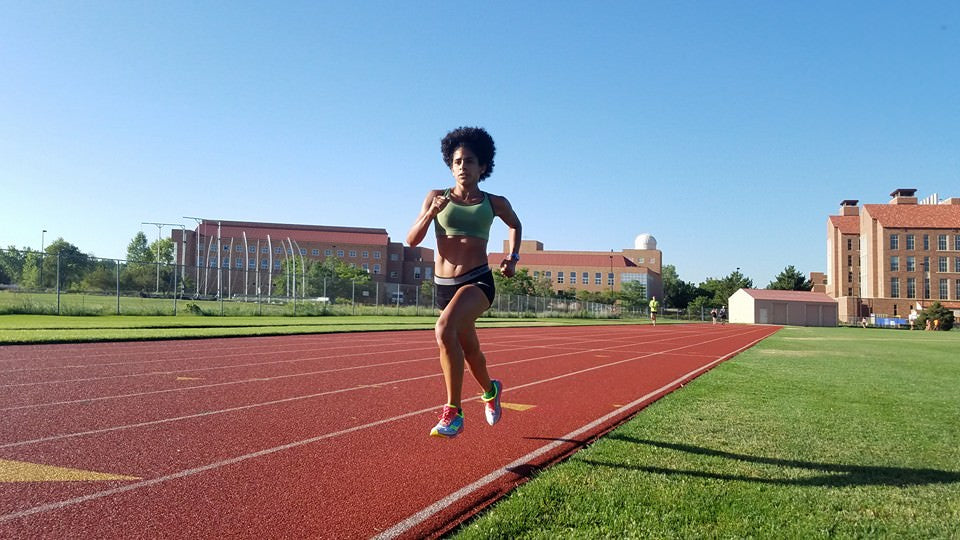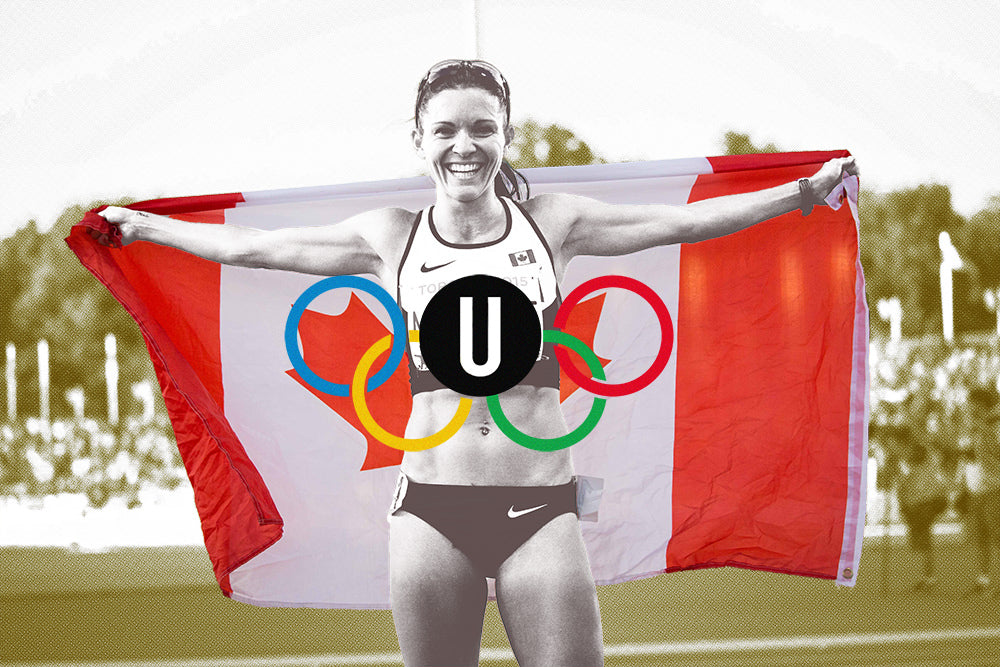Art: Vivian Shih
 After graduating from a stellar collegiate career at the University of San Francisco, a deep-rooted feeling crept through Maor Tiyouri. Its presence had always been a part of her, ever since she started running as a child in Israel. Each stride since those first races propelled her towards satiating that persistent feeling - a relentless curiosity brought about by a single question that her mind wouldn't let her silence: how fast could she run?
After graduating from a stellar collegiate career at the University of San Francisco, a deep-rooted feeling crept through Maor Tiyouri. Its presence had always been a part of her, ever since she started running as a child in Israel. Each stride since those first races propelled her towards satiating that persistent feeling - a relentless curiosity brought about by a single question that her mind wouldn't let her silence: how fast could she run?
In 2014, Tiyouri moved her life to the rugged mountain trails of Boulder, Colorado in search of an answer to this question. She had to know what her body was capable of when she ran against the best of the best - not just in America - but in the world.
For the next two years, the elevation of this mountain range would be her constant companion: the restricted oxygen naturally increasing her red blood cell count, the resistance of the sharp mountainous inclines pushing her body towards running a time that could change her life. Tiyouri's new training mates and their elite feet - turning over mile after mile next to her own stride - would provide the constant opportunity to push past her next threshold and into the 2016 Rio games.
However, months into her new adventure, Tiyouri was still searching for the job she needed to secure her American visa. Low on funds, away from her family and without the support of her University of San Francisco teammates and coach she had grown accustomed to during her first four years in America, Tiyouri was flooded with frustration. As her stress levels rose, the desire to obtain her dream became more and more deflated.
Against the first Colorado snowfall of that year, Maor Tiyouri took pause in the cold, foreign stillness to reflect. This was the first time she had seen snow. The icy flakes wafted onto the blanket of snow outside of her window, and a thought slowly crept into her mind. She found herself reflecting on the sacrifices, injuries and surprising loneliness of her decision to train across the world from her home country, for one race to be held on one day of her life. She asked herself a question she had never asked herself before: is this really worth it?
One year later, Maor Tiyouri would nearly walk away from it all.
If you're not going forward, you're going backward: From Israel to San Francisco
T iyouri was always an active child, and participated in many sports, including martial arts and tennis. Yet she took her first steps onto the track in Israel at the age of 12, fairly late by most American standards.
iyouri was always an active child, and participated in many sports, including martial arts and tennis. Yet she took her first steps onto the track in Israel at the age of 12, fairly late by most American standards.
"In Israel, the sports system is really different. It's not even remotely similar to what we have in the states as far as (athletic) programs in school or stuff like that….if you get involved in that, it's all on you, basically."
Through the encouragement of her close group of friends - who served as proxy coaches at the time - she decided to specialize in one sport to advance her chances of success. She chose to continue running, mostly because she seemed to be good at it.
"When you are young, you don't really think why you like running. If you're successful that's great."
Tiyouri grew and running grew with her, as did her youthful curiosity to push herself faster around each turn of the track. By the time she was 18, she had won two senior titles and 10 age category titles. Yet during her last years of high school, Tiyouri found it challenging to find consistent female competition in Israel that could push her to the next level.
Tiyouri joined an elite athletes program during her two years of mandatory service within the Israeli army after high school. This allowed her to continue to train and compete nationally and internationally. However, the program still wasn't providing her with the opposition she was hoping for, and her internal voice began to question how fast she could go if she found the next level of competition. Perhaps most importantly, running was no longer something she did because she was good at it. Over the years, the sport had become part of how she processed and experienced the world.
"It's the adrenaline when you race, when you go to workout, when you finish that workout...I kind of fell in love with it."
Yet in order to continue a serious running career after the army, Tiyouri would have to make s ome tough choices. Israel offered limited government-sponsored funding for elite athletes - a problem that still plagues the country today. Further, Tiyouri's chances of finding elite training partners would still be restricted. The decision was made. Tiyouri would leave Israel - far away from her close-knit group of friends and family - and pursue racing in America on an elite level.
ome tough choices. Israel offered limited government-sponsored funding for elite athletes - a problem that still plagues the country today. Further, Tiyouri's chances of finding elite training partners would still be restricted. The decision was made. Tiyouri would leave Israel - far away from her close-knit group of friends and family - and pursue racing in America on an elite level.
Getting to America, however, proved to be an entirely different challenge altogether. The ability to attend an American university and run without a scholarship would be impossible, and no one would offer Tiyouri a scholarship. Eventually, through many persistent emails and phone calls over a period of months, two universities came around with partial offers, including the University of San Francisco.
"We just clicked." says University of San Francisco head cross country and track and field coach Helen Lehman-Winters. "Coming from Israel, I felt that she had a ton of potential since she did most all of her training and racing all on her own. I figured that once she was able to train with a group she would really improve."
The immediate connection and faith Helen showed Maor over those initial phone calls provided the confidence Tiyouri needed to make the leap. More so, the trust built within those conversations proved to be the foundational core for a fruitful four-year relationship, in which the University of San Francisco would go on to pave the way to create one of the most successful cross country programs both in the West Coast Conference and the nation.
"It was the best decision I've ever made in my life." Tiyouri says with the same jubilant enthusiasm shining through as the day she signed.
 At first, the transition into running at the University of San Francisco wasn't easy. Stepping into a new country on the other side of the world, adapting to a new culture, and adjusting to school life were all things she expected to be bumpy. Running however, proved to need an adjustment. Maor had spent most of her young life far in front of the pack, winning every race and often leading from the start. Now, Tiyouri found herself dead center of the USF pack. If she was going to achieve her goals, Tiyouri realized quickly she needed to reframe her mindset from being the best - to progressing steadily with each run.
At first, the transition into running at the University of San Francisco wasn't easy. Stepping into a new country on the other side of the world, adapting to a new culture, and adjusting to school life were all things she expected to be bumpy. Running however, proved to need an adjustment. Maor had spent most of her young life far in front of the pack, winning every race and often leading from the start. Now, Tiyouri found herself dead center of the USF pack. If she was going to achieve her goals, Tiyouri realized quickly she needed to reframe her mindset from being the best - to progressing steadily with each run.
Because "Coach Helen" (as she's dotingly referenced by her USF squad), predicted this adjustment period, she was able to coach Tiyouri through the transition, helping her to stay focused and passionate about the sport:
"Obviously, there is an adjustment period of living in a new country and the learning curve of competing in the NCAA can be a challenging one." Lehman-Winters says, "But we are very patient with all of our athletes and understand that greatness takes time. I was well aware of Maor's Olympic aspirations and as with all of our elite athletes we try to keep the long-term big picture in mind as they move through our program. "
Over time, Maor grew as an athlete and eventually adjusted to running and racing with people, improving steadily with each practice.
"Every workout you did, you had to be on your A-game. You had to be on to stay in the game, you know? If you're not going forward you're going backwards."
The University of San Francisco distance team - comprised of mostly freshman - put in their miles and worked their way up in the conference as a pack, growing into an unstoppable force within the region. Within their first season together, USF raced their way into the first of four West Coast Conference championships, eventually garnering two NCAA XC appearances.
"The 2014 group was a special one - a really diverse group in almost every way from their personalities to their training capabilities - but they all shared the common goal of achieving and representing the University of San Francisco at the highest level. They just had a ton of fun together and ran for each other!" Helen Lehman-Winters, says.
The combination of the close team mentality and new training substantially improved Tiyouri's performances on the track as well. She went on to become a three-time individual NCAA qualifier on the track, including two 10,000 meter semifinal appearances during her time at USF. Despite her accomplishments, upon graduation, the desire to go after something bigger lingered within Tiyouri. Again the question burned in her mind: how fast could she really go if she went to the next level?
"As happy as I was with my college career, I don't feel like I achieved my college goals - it was just a step. I felt like I needed to keep fulfilling my potential. I had two more years to the Olympics. That was always in my mind - 2016."
You Can't Hide on the Track: From College to Colorado
Tiyouri started her transition from college to professional running in the exact same way she started her her transition from Israel to the United States: with an email.
A mutual runner and professional athlete whom Tiyouri met while running at USF, Matt Hensley, pointed her towards a man in Boulder Colorado named Lee Troop, a three-time Olympic marathoner from Australia. Troop had moved to Colorado from Europe just six short years earlier. Changing gears from athlete to coach, he went on to train some of America's top runners, including 2015 USA cross country champion and top American finisher in the 2015 New York City Marathon, Laura Thweatt. After a quick visit out to Colorado to explore the area and the team, Maor sensed the same familiarity and trust she felt with the University of San Francisco coach and team. Soon, she signed with the Boulder Track Club to run the 5k and 10k events.
 Little did Tiyouri know then, that adulting as an international, professional athlete would come with its own set of challenges. Starting over in an entirely new part of the country on her own, Tiyouri was now in charge of navigating and paying for all the provisions the USF athletic staff had previously covered during her time as scholarship athlete - including transporting to practices and races, access to accommodations for overnight races, and quality athletic trainers.
Little did Tiyouri know then, that adulting as an international, professional athlete would come with its own set of challenges. Starting over in an entirely new part of the country on her own, Tiyouri was now in charge of navigating and paying for all the provisions the USF athletic staff had previously covered during her time as scholarship athlete - including transporting to practices and races, access to accommodations for overnight races, and quality athletic trainers.
Frustratingly, Tiyouri's visa to stay in the United States was dependent on a job she didn't have and was having trouble securing. On top of this, she lacked the close-knit friends and family of her teenage years and yearned for the camaraderie of her close-knit team during her college years. It didn't help that the state of the world - particularly back near her home country - seemed to be worsening.
Tiyouri managed to capture a PR in the 5k that first year in Boulder and had a successful summer at the European Games and Israeli Championships. But the stressfulness of the situation began to creep into her running. The meditative centralness she was used to racing from suddenly became fractured as she became more cognizant to the reality of her circumstances. By the end of her fall road racing season, she was questioning everything.
"I wasn't super happy in Boulder. I wasn't super happy with my job. It put a damper on my happiness in general - and put a dent on my running. I don't want to sound dramatic but for me it was dramatic."
At the end of indoor season, Tiyouri sat down with Troop to discuss how long she wanted to continue running. Troop recognized the pressures layered into Maor's performance. As an ex-pat who traveled the world as a professional athlete for over 20 years, he knew how hard it was to navigate life as a professional athlete and how especially hard the "apprenticeship phase" of becoming a professional international athlete could be. But the edge Tiyouri needed to stay mentally sharp to qualify for the Olympics was softening dramatically, and he wasn't sure how much longer she was going to hold.
"It was very emotional. (Lee) told me that, he doesn't think track would be great for me this year, because I wasn't doing so well and you can't really hide on the track."
Troop warned her that once running became a chore, she would be done within a year. Then, Troop told Tiyouri the hard truth: he didn't think she would be able to qualify in the 5k or the 10k in the Olympics. The only way she could get out of the hole she was in, was to run the marathon.
The idea shook Maor. At 25 years old, the idea of running the marathon so early in her career wasn't something she had considered seriously.
"She told me she didn't think she was ready to do one." Troop says of the exchange, "And I told her, 'You're not. You're definitely not ready to do one.'"
Troop's rationale was unorthodox but calculated: Tiyouri was still young and her body was relatively injury free. She had a great chance to pursue a successful career after these Olympics.
"Maor could be one of the greatest Israeli athletes ever and set a precedent for other Israeli women to follow in her footsteps." Troop says, "She could be the fastest from the 800 to the marathon. This is the legacy that she can live for women and in particular, for women in Isreal."
But first, Tiyouri needed to rejuvenate her passion for the sport. Marathon training would be a way to provide Tiyouri with the inspiration she needed to run fast once more.
"(Troop) told me marathon training is intense, but you can go outside and run fartleks or tempos. it could elevate my spirit." Tiyouri recalls of the insights that pushed her move to the marathon. With the window to Olympic qualifications quickly closing, they made the decision to refocus her training.
"This was about getting her attitude to shift," Lee said. "She wasn't convinced at first, but we got four weeks in and she was a different person: more committed, more dedicated. Rather than asking questions, she just did it and knew it had to be done."
In two short months, Tiyouri would run 20 miles more than she had ever run in a race. Tiryouri would run the marathon.
The Olympic Dream: Strides of Faith 
"To Maor's credit, I honestly didn't know where we would be in March when we had that conversation. I didn't know if I'd see her again. If she would turn it around." Troop says of their initial conversation in the spring of 2016.
But with only two short months to gear up for her first marathon, Maor drew on the wisdom of her three-time Olympic marathon coach, as well as her other teammates -many of whom ran marathons themselves - to fill in the blanks of her own inexperience with the race. Her training was especially tough but it was her nerves that were the most daunting: having never run the marathon before, there were several things that could go wrong.
"You hear so many things about so many people that go wrong with their first marathon. I didn't really know what to expect."
It was here that Tiyouri had her second major moment of pause during her time in Colorado. This time however, instead of looking around her for energy, she looked inside herself for the answer. She realized taking blind leaps - or rather - strides of faith were a consistent part of her narrative in running and in life. This marathon was no different from her decision to leave Israel, to join the University of San Francisco team, or to train as a professional runner in Colorado. Running an Olympic qualification marathon blindly was simply the next stride in her own personal race through life.
"I didn't know how it was going to end, but had to do it. It could change my life. At the end of the day, you have to face the challenge yourself."
The conditions weren't looking favorable the day of the marathon. Humidity and heat plagued the course, so much so officials almost canceled the race, citing the exceedingly high temperatures as a reason to forgo the race altogether. To Maor's credit however, she kept on pace and looked like she would hit qualifying standards for most of the run.
However, trouble mounted around the 35K mark, when fatigue started to set in. Hurting and feeling as though she could barely move her legs, she heard her coach's voice: ten more minutes of pain and you'll be an Olympian for the rest of your life.
Maor looked up and saw Troop. Standing next to him was Tiyouri's father, who had never seen Maor race outside of Israel and had traveled to see her chase her Olympic dream. She dug in deep, and listened to her persistent voice that had pushed her towards running faster for the past 12 years, integrating all the lessons she had learned in Israel and San Francisco and Colorado into these last few minutes of the biggest race of her life. When Maor crossed the finish line that day, she not only qualified for Rio, she took the next leap in her running career.
Though she's only had a few weeks to wind down and gear up for the next marathon, Tiyouri hopes to continue to build her confidence and passion for this sport at this Sunday's Olympic race:
"Since its going to be my second marathon, I'll have a lot to give."
True to form, the young Israeli athlete is already eying the next round of games and the next stride to take.
"I have unfinished business on the track. I'm going to take a little break after the Olympics. (But) I want to run tough on the track in the 5k and 10k. I don't feel like I've reached my potential. I want to work on another Olympic circle - another 4 years. I'm planning to stay here and work toward those goals."
Follow Maor Tiyouri throughout her Olympic experience on twitter @tiyouri & Instagram @maor_tiyouri.
Catch Maor's race in the women's marathon on Sunday, Aug 14th at 8:30 AM on NBC.





